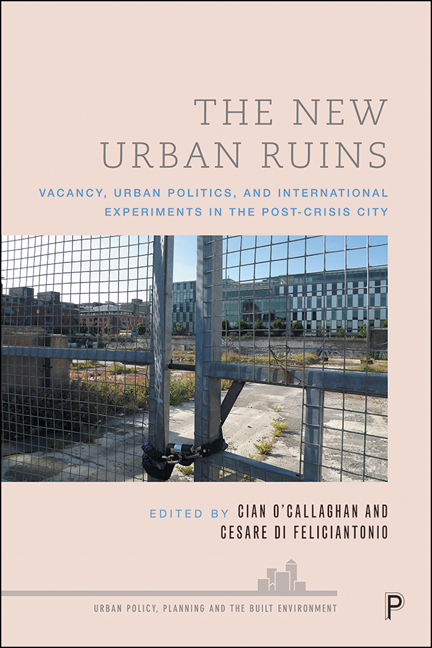Book contents
- Frontmatter
- Contents
- List of figures and tables
- Notes on contributors
- Acknowledgements
- Introduction
- PART I Rethinking ruination in the post-crisis context
- PART II The political economy of urban vacant space
- PART III Reappropriating urban vacant spaces
- Conclusion: Centring vacancy – towards a research agenda
- Index
11 - Spatio-legal world-making in vacant buildings: property politics and squatting movements in the city of São Paulo
Published online by Cambridge University Press: 13 May 2022
- Frontmatter
- Contents
- List of figures and tables
- Notes on contributors
- Acknowledgements
- Introduction
- PART I Rethinking ruination in the post-crisis context
- PART II The political economy of urban vacant space
- PART III Reappropriating urban vacant spaces
- Conclusion: Centring vacancy – towards a research agenda
- Index
Summary
Introduction
The definition of urban vacancy is fraught with conceptual and practical difficulties. The definitions vary as widely as do the different forms of state intention designed to reduce vacancy. With this in mind, the proposition here is that vacancy is the frontier space where different spatio-legal world-making projects collide. This chapter centres on three conflicting spatio-legal logics and how they relate to persistent vacant spaces in the centre of São Paulo. Recent statistics for the metropolitan region highlight the explosive combination of 595,691 vacant buildings with the potential of being occupied and 639,839 inhabitants left homeless or living in precarious conditions (Fundaçao Pinheiros, 2018). On the one hand, a market logic values vacancy as a necessary condition for the generation of speculative profits. On the other, the bureaucratic logic of controlled consumption views vacancy as inefficient because it does not provide socially or economically productive uses. Lastly, squatting movements see the potential in these vacant spaces to reduce the astronomical housing deficit and, in particular, the lack of centrally located social housing.
This chapter argues that vacancy is a socially constructed category (Sack, 1983), both spatially and legally (Delaney, 2010). Ideas of empty property and empty space are entwined and cannot be completely separated. Spaces are considered vacant because they are not deemed economically or socially productive, and because they do not present visible signs of being actively owned. The physical emptiness can facilitate potential sales or being filled with different social uses (Vasudevan, 2015). However, the concept of vacancy is contested. The research this chapter draws on – interviews held at a particular moment in Brazilian politics in 2016 when both federal and municipal administrations were in the hands of the Partido dos Trabalhadores (‘Workers Party’ [PT]) – focused on a conflict in a space of vacancy, understanding conflicts as privileged moments of social construction that destabilise and potentially realign the social fabric by pitting different spatio-legal projects against each other. The claim of this chapter is that different spatio-legal imaginaries clash in concrete spaces through contact between their distinct lived expressions. In the example discussed here, it is the material experience of a police force that clashes with practices of micro-sovereignty at an occupation.
- Type
- Chapter
- Information
- The New Urban RuinsVacancy, Urban Politics, and International Experiments in the Post-Crisis City, pp. 197 - 210Publisher: Bristol University PressPrint publication year: 2021



